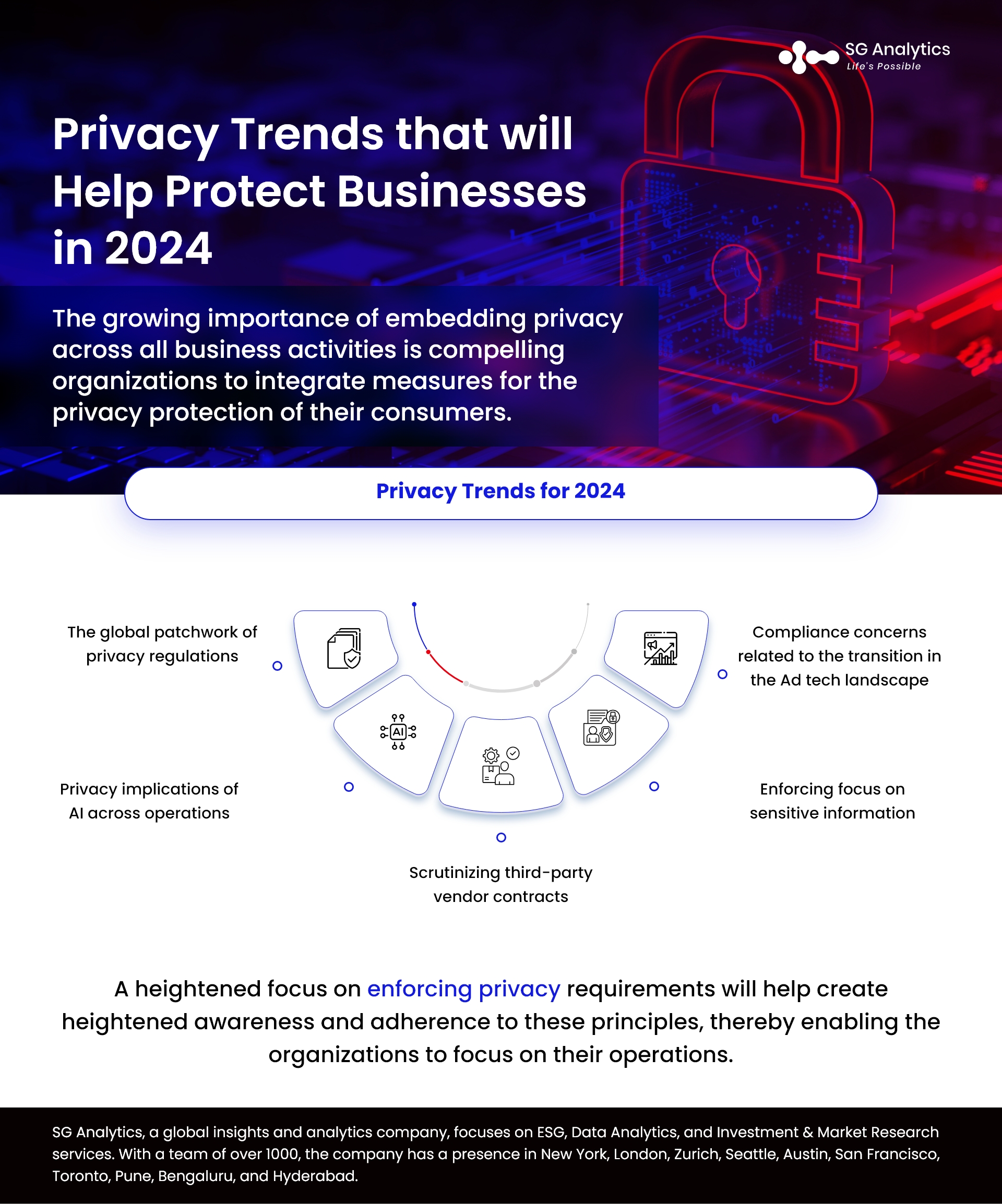The growing importance of embedding privacy across all business activities is compelling organizations to ramp up their effort to ensure privacy protections for their consumers. It is also vital for them to look to the horizon and try to identify major privacy trends that can be expected in 2025 to take center stage. With the emerging privacy trends, organizations can expect:
- A continuing patchwork of privacy regulations
- Solutions for privacy challenges resulting from AI
- Compliance headaches due to the shifting ad-tech landscape
- Enforcement of policies focusing on sensitive data security
- Increased operational compliance due to ambiguity in data collection
By being proactive with their privacy strategy, organizations can prepare to identify and comply with their privacy needs in 2025. Let's dive into these trends to explore what organizations should be aware of.
Read more: Top Digital Business Transformation Trends
-
The Global Patchwork of Privacy Regulations
With new data privacy acts coming into force and carrying obligations related to privacy, organizations are traversing the landscape of the current state of privacy regulations. However, without a comprehensive federal privacy regulation, unique individual state laws dictate there is an obligation for privacy laws in effect. They are also working towards new and updated privacy legislation to amend the existing data protection laws.

With the complexity of global regulations, it has become critical for businesses to focus on the fundamentals of understanding all collected data, the platforms where data is being sent, as well as what is being done with the data collected from consumers. Maintaining proper documentation for data-related activities will make compliance immeasurably simpler and ultimately will lead to faster time for the deployment of new strategies and initiatives.
-
Implications of AI across Operations
Every business today has plans related to integrating artificial intelligence across operations, which has led to the creation of new products with AI or using new technologies that leverage AI to become more efficient and effective. It is, therefore, important to consider the privacy implications and requirements for all of these.
With a growing number of AI-specific regulations coming into force or being crafted, existing privacy requirements are also applicable to AI. The aspects of existing privacy regulations are requirements related to data input and automated decision-making. Organizations need to consider the data inputs being fed to the AI systems and machine learning algorithms. The data must be compliantly collected, and the usage of the data should align with existing privacy requirements.
Read more: Striking the Right Balance Between Personalized Customer Experiences and Data Privacy
-
Scrutinizing Third-Party Vendor Contracts
Organizations are likely to get in trouble due to privacy concerns. Even businesses with solid privacy practices can be held liable for the actions of vendors. To protect business in 2025, it is important to:
- Review vendor contracts and ensure they include appropriate data privacy and protection framework.
- Implement systems to identify, manage, and mitigate information and privacy risks.
- Understand how vendors use personal information associated with data processing agreements.
- Conducted information security and privacy assessments to confirm third-party vendors comply with applicable data privacy laws.

-
Compliance Concerns Related to the Transition in Ad Tech Landscape
The data privacy discussions revolve around questions from advertisers about how they can accomplish strategies to target and measure their favorite tool that may or may not be available due to Google's new process of sunsetting support for third-party cookies in Chrome. The new AI capabilities in ad tech platforms, along with alternative identifiers, are equipping businesses with new technical knowledge and compliance.
However, it is important to consider the privacy principle related to AI requirements and concerns related to automated decision-making. While the changes can impact current policies and processes related to privacy strategy for data collection, the same process will present many new technologies set to enter the market.
Read more: Big Ideas that Will Change the World
-
Enforcing Focus on Sensitive Information
Enforcement bodies are signaling the enforcement of actions and strategies with a heightened focus on various types of sensitive data. These enforcement actions for data violations will help extend many protection principles associated with data security.
For organizations, this will imply implementing critical measures to identify if any sensitive data is being collected and used throughout the organization. This will include data comments like demographic information along with granular location data and biometric information. This collected data inventory collection across digital assets will help identify any instances of sensitive data collection and ensure applicable laws and requirements are being followed.
Planning for Sustainable Compliance Across Organization
The efforts that organizations put into establishing privacy compliance should not just get buried. While new laws will be introduced each year, organizations need to build a durable data privacy governance framework with a few best practices:
- Aligning privacy regulations with the organization's strategy.
- Establishing and maintaining privacy frameworks that align with privacy principles.
- Implementing a risk-based approach with a focus on high-risk critical business processes.
- Integrating privacy practices as a core part of your business.
- Having a dedicated resource that focuses on privacy.
- Being consistent in privacy tasks.
While it is vital for organizations to enhance the quality of the work being done, it is equally vital to ensure that the privacy rights of consumers are being adhered to. A heightened focus on the enforcement of privacy requirements will help create heightened awareness and adherence to these principles, thereby enabling the organizations to focus on their operations.
Read more: Establishing Transparency and Trust to Safeguard Sensitive Customer Data

Conclusions
With organizations witnessing new methods of monitoring data flows, along with documenting data practices and instituting controls for compliance, there is a need to put new frameworks to work. Data architecture today is becoming more prevalent, and compliance professionals need to be educated on the nuance of how it all works, as well as be involved in the design process. Organizations also need to ensure operational and technical safeguards are put into practice to ensure a defensible position against legal challenges.
2025 is shaping up as the year of education concerning data privacy regulations for organizations. The technology industry is also witnessing a radical shift in the underlying architecture of the web. And with every industry learning together in this dynamic environment, it is important to focus on the things that never change—the fundamentals of data security and privacy.
Organizations need to be explicit about exactly what data is being collected and how the collected data is being used, as well as which platforms are involved in realizing the desired outcomes. By focusing on these fundamentals and working closely with compliance teams, organizations can design and test new technology to not end up on the wrong side of compliance enforcement.
SG Analytics, recognized by the Financial Times as one of APAC's fastest-growing firms, is a prominent insights and analytics company specializing in data-centric research and contextual analytics. Operating globally across the US, UK, Poland, Switzerland, and India, we expertly guide data from inception to transform it into invaluable insights using our knowledge-driven ecosystem, results-focused solutions, and advanced technology platform. Our distinguished clientele, including Fortune 500 giants, attests to our mastery of harnessing data with purpose, merging content and context to overcome business challenges. With our Brand Promise of "Life's Possible," we consistently deliver enduring value, ensuring the utmost client delight.
A leader in Business Insights, SG Analytics enables organizations to achieve actionable insights into products, technology, customers, competition, and the marketplace to make insight-driven decisions. Contact us today if you are an enterprise looking to make critical data-driven decisions to prompt accelerated growth and breakthrough performance.
About SG Analytics
SG Analytics is an industry-leading global insights and analytics firm providing data-centric research and contextual analytics services to its clients, including Fortune 500 companies, across BFSI, Technology, Media and entertainment, and Healthcare sectors. Established in 2007, SG Analytics is a Great Place to Work® (GPTW) certified company and has a team of over 1100 employees and has presence across the U.S.A., the U.K., Switzerland, Canada, and India.

